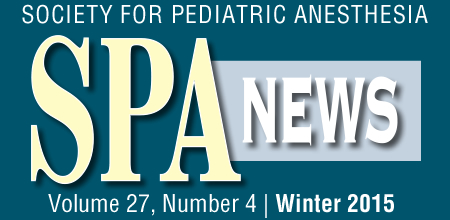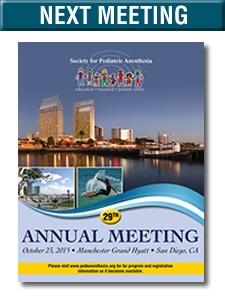spa meeting reviews
Professionalism Panel
By Zulfi Ahmed, MD
Anesthesia Associates of Ann Arbor
Ann Arbor, MI
The Sunday morning ses sion was themed as a “Professionalism Panel” and the first speaker of the day was Linda Mason MD (Loma Linda University, Loma Linda). Dr. Mason has risen through the ranks of the American Society of Anesthesiologists (ASA) and currently serves as secretary of the ASA. The objectives of her talk were to understand options for leadership positions in medical staff and professional societies; to understand the process to achieve these positions; and to gain knowledge of the skills necessary for success. Dr. Mason emphasized the need for anesthesiologists, particularly pediatric anesthesiologists, to stand up as leaders and advocate for both patients and profession.
According to Dr. Mason, the various opportunities available to physicians constitute a long list. This list includes various hospital, educational bodies, county, state and national medical societies, subspecialty and component state medical societies and ASA. The list also includes operating room, quality improvement, infectious diseases, blood utilization, credentialing and bylaws committees, education, GME, PPEC and committees at one’s hospital and ACGME among many others.
Dr. Mason advised the audience to utilize the skills of effective listening and conversation, to show up at meetings and to seek opportunities to become chair of such committees. She gave her own example of starting work in the California State Medical Society (CSA) where the majority of members were internists and pediatricians. With effective collaboration and teamwork, she rose through the ranks of CSA. She entered the ASA ranks via the door of education by participating in arranging scientific programs and then later decided to run for office with a clear picture in her mind that she may not succeed.
She utilized skills and advantages acquired along the way. These included being an anesthesiologist involved outside the operating room, an involved and interested professional influencing policies and regulations within her state and an advocate with a wide circle of influence. She also mentioned the large number of committees, special interest groups, closed groups and other SPA initiatives available to influence the profession of pediatric anesthesia. These opportunities can lead to leadership positions within our society.
ASA has more than 90 committees and sub committees, presenting many opportunities to participate, influence and lead. Self-nominations run from Nov 15th to Jan 15th every year. One should approach the committee chair who then advises the president regarding appointment to the committee.
The essence of her lecture is summarized thus:
- Pick an area of interest and passion
- Say yes-be involved
- Show up
- Be a good listener
- Develop good communication skills-give your input
- Be professional
- Be ready to move into a different position or arena-timing is everything
- Enjoy your role
- Don't give up-if at first you don’t succeed, try again
Her last slide included the following quote from Winston Churchill: “Success is the ability to go from failure to failure with no loss of enthusiasm”.
Jennifer Aunspaugh MD (Arkansas Children Hospital, Little Rock) spoke on “Goals of accomplishment in the first ten years of practice” and started with a reference to two books, both written by Lois Zachary. The names of the books were “The Mentors Guide” and “The Mentees Guide”. According to Dr. Aunspaugh, a mentor acts as a guide to help us define and understand our goals and how to pursue them successfully. It is a learning relationship. She showed data that 60% of medical departments have an informal mentorship programs but only 20% have a formal mentorship program. According to Dr. Aunspaugh a mentor is important to help obtain career satisfaction and confidence as an educator rises and the impact a mentor makes on academic progress and meeting career goals is immense. Mentored physicians are likely to mentor others which leads to increased personal and professional fulfillment.
The important qualities of a mentor are admirable character, professional/personal balance, strength of time commitment and legacy of mentoring.
Her SMART acronyms to set up mentoring goals were:
Specific
Measureable
Action-oriented
Realistic
Timely
She also mentioned the ASA wellness task force created in 2006 as a valuable resource to balance work-life well being and prevent burnout. Her tips to achieve work-life balance were:
- Don’t be afraid to say no
- Ask for help!!! Cultivate a relationship
- Accept the things you cannot change
- Detach from technology when necessary
Dr. Aunspaugh emphasized the need for networking and said that a person who is high on networking ability is best positioned to successfully build effective and advantageous partnerships with others at work. Like Dr. Mason, she emphasized the need to participate and serve on committees at hospital, local and national levels. Her advice for evolving as an educator was to seek out opportunities locally such as medical student lectures, simulation exercises and workshops. Teaching workshops through the Society of Education in Anesthesia and Masters programs in education may also be considered.
Finally, some of the stalwarts of SPA and seasoned pediatric anesthesiologists spoke on “the last ten years of careers” and how to wind oneself down in preparation for retirement. The speakers included Gregory Hammer MD (Lucille Packard Children’s Hospital, Palo Alto), George Gregory MD FAAP (UCSF, San Francisco), Aubrey Maze MD (Phoenix Children’s Hospital, Phoenix) and Ann Lynn MD (Seattle Children’s Hospital, Seattle).
Dr. Hammer discussed retirement planning in detail. For a new graduate, often a choice exists between paying off debt and saving for retirement. Dr. Hammer emphasized the need for early retirement savings. A small amount saved early is more beneficial then a large amount saved late. The professional journey is better if we control it rather than enduring changes imposed by others. The last ten years are a misnomer. Rather, our careers should be part of our life continuum, not seen as a linear career path with discrete stages. Transition does not have to occur as set chronological time points.
A number of hospitals and major institutions have faculty transition task forces helping physicians to identify and address issues experienced by senior faculty. These transitions include assuming a more focused faculty role, scaling back the intensity of research activities and moving from active duty to emeritus status. A considerable number of senior anesthesia faculty surveyed in anesthesia felt that they did not have enough saved for retirement and were delaying retirement into their seventies. Many faculty members have not engaged in personal financial planning. Many faculty members lack information relevant to retirement. The basics of retirement planning include the following principles:
- Maximize retirement contributions (take full advantage of employer match programs)
- Start as early as possible
- Get good advice from financial planners, benefits advisors and go to HR workshops (often free).
All the speakers agreed that one should realize when faculties such as vision begins to fade, stamina begins to decrease; it is better to think about retirement planning rather than it be forced upon oneself. It is of utmost importance that one should not only plan for financial well being but physical and mental well being as early as possible. Recognize warnings of stress (fatigue, muscle tension, trouble concentrating and anger). Avoid excessive caffeine, alcohol and sugar. Have a friend who can help one understand these changes. Meditation, exercise and humor are tools to stay mentally fit and reduce stress.
A number of reasons have been identified for people to take retirement. Quality time with family is usually the most important factor followed by financial preparedness to retire. Dr. Hammer quoted Dr. Robert Friesen who said: “Don’t postpone the things you love to do until retirement. Take a day off every week to go hiking, fishing or skiing. Balance in your life is refreshing and will prolong satisfaction with your career.” Try serving on a national committee, accepting a leadership role in your department or take on a new or different academic project. This will renew your professional life and keep you engaged. Dr. Hammer also quoted Jumbo Williams from UCLA: “Fulfillment in life? I have always regarded work as a temporary solution.”
Dr. Gregory gave his perspective on this topic by saying that he always enjoyed teaching and providing anesthesia care. His reason to retire was to care for his wife who underwent a successful heart bypass but suffered from partial neurologic weakness. Nonetheless she did not want him to hang around the house. In order to find something which stimulated him mentally and physically he goes to the university periodically otherwise has committed himself to conducting educational courses in third world countries (a term he hates but uses for the sake of common understanding). He has recently finished a book on anesthesia care in underserved locations and it is available for free from him through SPA. His financial considerations for retirement were, could he afford to retire, how much would he need each month and was his mortgage paid? He said that he was lucky that the university had a great retirement plan, but recommended starting early; having a plan of how much one will need at retirement and sticking to that plan.
Dr. Lynn presented her clues to when it is time to start planning to retire. These include AARP starting to send letters, practice area growing so much you fear that you may get lost and receiving an invitation to join the panel she was speaking at! Her reasons to retire were that she was able to financially afford retirement and she was able to slow down. Dr. Lynn mentioned that one should stop before someone else asks you to, be flexible and find new arenas of interest. Dr. Lynn started providing acupuncture and has taken more administrative duties. She plans to spend more time with family, travel and pursue outside interests. She suggested living like a resident as long as possible in order to maximize retirement contributions. It is important that one’s physician group provides flexibility to slow down and accommodates comfort with lesser case complexity.
Dr. Maze provided his approach to retirement planning. He echoed the previous sentiments that having a friend who can help you realize it is time to plan for retirement is valuable. He joked about caring less for personal appearance and using scrubs more often. Next steps for him included relieved himself from shareholder status, performing anesthetics for cases he felt comfortable doing, easing up on call requirements and reassessing administrative duties. He has begun to immerse himself more with family activities, travelling, reading and community non-profit projects. Dr. Maze enrolled early in a retirement plan with an aggressive approach and invested with discipline. He plans to spend wisely with the intent of living a long life!



